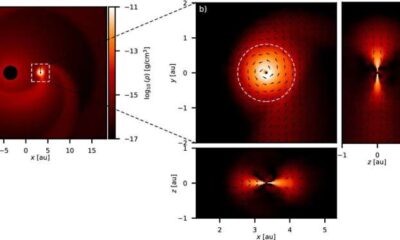Health
New Study Reveals Tumor Infiltration as Key Cause of Cancer Deaths

A groundbreaking study led by researchers at UT Southwestern Medical Center suggests that the leading cause of cancer-related deaths may not be the metastatic disease as previously believed, but rather the infiltration of tumors into major blood vessels. This infiltration can lead to blood clots and multiorgan failure, according to findings published on October 16, 2025, in the journal Nature Medicine.
The research team, including Matteo Ligorio, M.D., Ph.D., and Kelley Newcomer, M.D., aimed to answer a critical question: what triggers the death of cancer patients? Despite patients often living with metastatic disease for years, the mechanisms leading to their eventual decline have remained ambiguous.
Cancer accounts for approximately 600,000 deaths annually in the United States alone. Traditionally, metastasis, the spread of cancer cells to different body parts, was thought to be the primary reason for mortality. However, the study highlights that many patients live for extended periods with metastatic disease, indicating that other factors may be at play when they ultimately succumb to their illness.
To explore these unknowns, Drs. Newcomer and Ligorio analyzed a cohort of over 100 patients with various cancers, including colorectal, lung, ovarian, liver, and pancreatic cancers, who had passed away at William P. Clements Jr. University Hospital and Parkland Health. The researchers conducted routine autopsies, focusing on the integrity of major blood vessels, an area often overlooked in standard procedures.
The modified autopsies revealed a disturbing trend: tumors were found to be penetrating the walls of major blood vessels such as the portal vein and inferior vena cava. In some instances, imaging studies indicated that these invasive tumors were detectable weeks or even months before death. Furthermore, blood samples taken during the study indicated a significant increase in cancer cells in the bloodstream shortly before death, suggesting that the cardiovascular system plays a crucial role in the progression of cancer.
Dr. Ligorio proposed a new theory based on these observations. When tumors grow near major blood vessels, fragments of these tumors can break away and enter the bloodstream, increasing the likelihood of blood clots. Such clots can obstruct blood flow to vital organs, leading to multiorgan failure and, ultimately, death.
To further validate this theory, researchers examined CT imaging data from 1,250 cancer patients who had died, collaborating with Dr. Dario Ghersi, M.D., Ph.D., and Dr. William Gasper, Ph.D., from the University of Nebraska. The analysis confirmed that many of these patients had tumors infiltrating major blood vessels, reinforcing the idea that this infiltration may significantly contribute to cancer mortality.
Dr. Newcomer emphasized the potential implications of these findings. “Surgery or radiation to treat tumors that are approaching large blood vessels could transform how we diagnose, manage, and treat patients with cancers,” she noted.
The researchers expressed gratitude to the patients and families who participated in this study, which aims to enhance the scientific understanding of cancer and pave the way for new treatments. They acknowledged the collaboration of three hospice organizations: Visiting Nurse Association of Texas, Faith Presbyterian Hospice, and Pathway Hospice.
Looking ahead, Dr. Ligorio and Dr. Newcomer, alongside Herbert J. Zeh III, M.D., are designing clinical trials to test therapeutic approaches focused on tumor-vessel infiltration, with the hope of significantly extending survival, particularly for patients with advanced cancer.
This research received funding from multiple sources, including the Cancer Prevention and Research Institute of Texas and the National Cancer Institute, demonstrating a significant commitment to advancing cancer treatment and understanding.
As the landscape of cancer treatment evolves, this study underscores the importance of investigating the biological mechanisms behind cancer mortality, which could lead to more effective interventions and improved patient outcomes.
-

 Health2 months ago
Health2 months agoNew Gel Offers Hope for Regrowing Tooth Enamel in Dentistry
-

 Science2 months ago
Science2 months agoUniversity of Hawaiʻi at Mānoa Joins $25.6M AI Initiative for Disaster Monitoring
-

 Science1 month ago
Science1 month agoALMA Discovers Companion Orbiting Red Giant Star π 1 Gruis
-

 Lifestyle1 month ago
Lifestyle1 month agoPark Jung Min’s Endearing Moment with Hwasa Steals Show at Awards
-

 Science2 months ago
Science2 months agoIROS 2025 to Showcase Cutting-Edge Robotics Innovations in China
-

 Lifestyle2 months ago
Lifestyle2 months agoStone Island’s Logo Worn by Extremists Sparks Brand Dilemma
-

 Lifestyle2 months ago
Lifestyle2 months agoSampson County Celebrates Susie Faison’s 100th Birthday Milestone
-

 Lifestyle2 months ago
Lifestyle2 months agoMary Morgan Jackson Crowned Little Miss National Peanut Festival 2025
-

 Health2 months ago
Health2 months agoStartup Liberate Bio Secures $31 Million for Next-Gen Therapies
-

 Health2 months ago
Health2 months agoTop Hyaluronic Acid Serums for Radiant Skin in 2025
-

 Science2 months ago
Science2 months agoArizona State University Transforms Programming Education Approach
-

 Politics2 months ago
Politics2 months agoJudge Considers Dismissal of Chelsea Housing Case Citing AI Flaws









